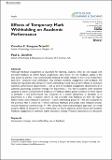Files in this item
Effects of temporary mark withholding on academic performance
Item metadata
| dc.contributor.author | Kuepper-Tetzel, Carolina E. | |
| dc.contributor.author | Gardner, Paul L. | |
| dc.date.accessioned | 2021-03-11T11:30:06Z | |
| dc.date.available | 2021-03-11T11:30:06Z | |
| dc.date.issued | 2021-03-09 | |
| dc.identifier | 273263344 | |
| dc.identifier | 9c70e0a2-ef2d-4843-860b-5c17817b5924 | |
| dc.identifier | 85102646026 | |
| dc.identifier | 000628960100001 | |
| dc.identifier.citation | Kuepper-Tetzel , C E & Gardner , P L 2021 , ' Effects of temporary mark withholding on academic performance ' , Psychology Learning & Teaching , vol. Online First . https://doi.org/10.1177/1475725721999958 | en |
| dc.identifier.issn | 1475-7257 | |
| dc.identifier.other | RIS: urn:20D739206C950D39BAF8555D6E93D5AE | |
| dc.identifier.uri | https://hdl.handle.net/10023/21608 | |
| dc.description | The authors would further acknowledge that part of this research was supported by the Proctor's Teaching Development Fund at the University of St Andrews, UK. | en |
| dc.description.abstract | Although feedback engagement is important for learning, students often do not engage with provided feedback to inform future assignments. One factor for low feedback uptake is the easy access to grades. Thus, systematically delaying the grade release in favor of providing feedback first—temporary mark withholding—may increase students’ engagement with feedback. We tested the hypothesis that temporary mark withholding would have positive effects on (a) future academic performance (Experiments 1 and 2) and (b) feedback engagement (Experiment 2) in authentic psychology university settings. For Experiment 1, 116 Year 2 students were randomly assigned to either a Grade-before-feedback or Feedback-before-grade condition for their report in semester 1 and performance was measured on a similar assessment in semester 2. In Experiment 2, a Year 3 student cohort (t) was provided with feedback on their lab report before marks were released in semester 1 (mark withholding group, N = 97) and compared to the previous Year 3 cohort (t-1) where individual feedback and grades were released simultaneously (historical control group, N = 90). Using this multi-methodological approach, we reveal positive effects of temporary mark withholding on future academic performance and students’ feedback engagement in authentic higher education settings. Practical implications are discussed. | |
| dc.format.extent | 15 | |
| dc.format.extent | 505818 | |
| dc.language.iso | eng | |
| dc.relation.ispartof | Psychology Learning & Teaching | en |
| dc.subject | Assessment strategy | en |
| dc.subject | Mark withholding | en |
| dc.subject | Use of feedback | en |
| dc.subject | BF Psychology | en |
| dc.subject | NDAS | en |
| dc.subject.lcc | BF | en |
| dc.title | Effects of temporary mark withholding on academic performance | en |
| dc.type | Journal article | en |
| dc.contributor.institution | University of St Andrews. School of Psychology and Neuroscience | en |
| dc.contributor.institution | University of St Andrews. Centre for Higher Education Research | en |
| dc.identifier.doi | https://doi.org/10.1177/1475725721999958 | |
| dc.description.status | Peer reviewed | en |
This item appears in the following Collection(s)
Items in the St Andrews Research Repository are protected by copyright, with all rights reserved, unless otherwise indicated.

